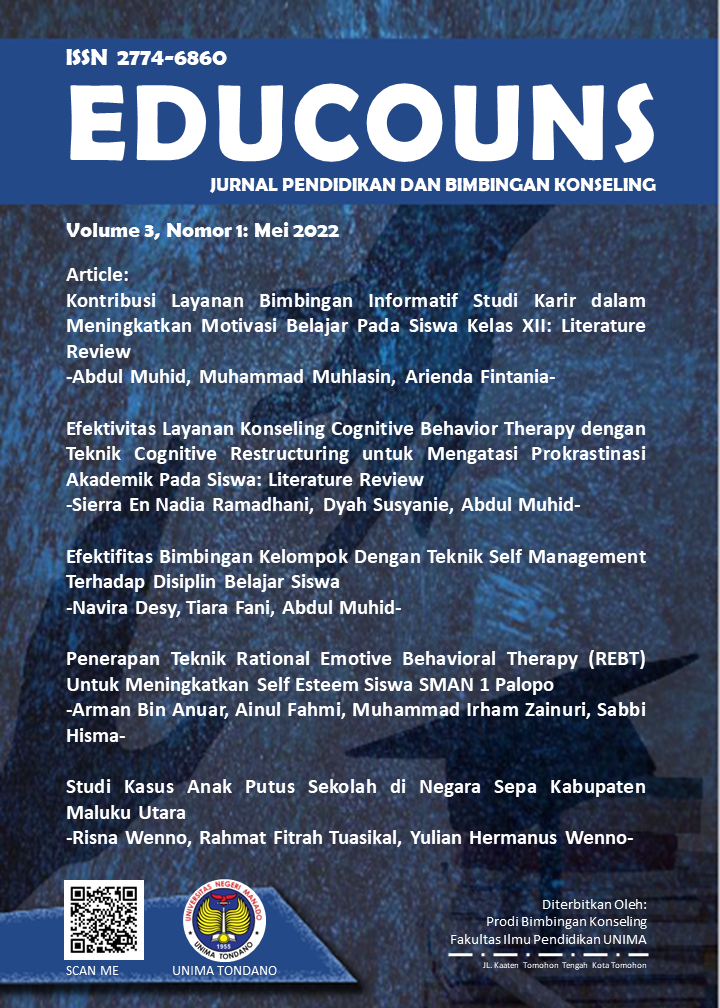EFEKTIVITAS KONSELING COGNITIVE BEHAVIOR THERAPY DENGAN TEKNIK COGNITIVE RESTRUCTURING UNTUK MENGATASI PROKRASTINASI AKADEMIK PADA SISWA
DOI:
https://doi.org/10.53682/educouns.v3i1.3275Keywords:
Counseling Cognitive Behavior, Cognitive Restructuring, Procrastination AcademicAbstract
Efektifitas pembelajaran online bergantung pada pembelajaran mandiri siswa yang didukung dengan sikap serta kepribadian siswa. Siswa membutuhkan kemampuan dalam menguasai penggunaan perangkat teknologi dan tidak hanya itu siswa juga dihadapkan dengan pengaturan otonomi kegiatan dan interaksi secara online yang kurang spontan menyebablan penundaan dalam pengerjaa tugas. Prokrastinasi masih sering dilakukan, prokrastinasi merupakan penghindaran melakukan tugas yang perlu dicapai dengan waktu tertentu. Tidak hanya itu, dengan adanya bantuan dari layanan konseling Cognitive Behavior Therapy, siswa akan dibantu secara penuh untuk melakukan penekanan pada prokrastinasi akademik mereka. Maka dari itu, harus diadakan upaya serta strategi yang dilakukan agar prokrastinasi akademik yang dilakukan oleh siswa dapat direduksi dengan adanya pengendalian dengan adanya Konseling CBT dengan teknik Cognitive Restructuring. Metode penelitian yang diterapkan pada penelitian kali ini adalah literatur review atau studi literatur dengan digunakannya penerapan pada artikel sebagai bentuk literatur atau sumber yakni dari artikel, jurnal, dan buku yang selaras dengan topik pembahasan pada artikel. Yang menghasilkan adanya hubungan negatif antara prokrastinasi dan konseling cognitive behavior therapy.
References
Bao, W. (2020). COVID-19 and online teaching in higher education: A case study of Peking University. Human Behavior and Emerging Technologies, 2(2), 113–115. https://doi.org/10.1002/hbe2.191
Chun Chu, A. H., & Choi, J. N. (2005). Rethinking Procrastination: Positive Effects of “Active” Procrastination Behavior on Attitudes and Performance. The Journal of Social Psychology, 145(3), 245–264. https://doi.org/10.3200/SOCP.145.3.245-264
Corey, G. (2013). Theory and Practice of Counseling and Psychotherapy (9th ed.). Brooks/Cole.
Dong, C., Cao, S., & Li, H. (2020). Young children’s online learning during COVID-19 pandemic: Chinese parents’ beliefs and attitudes. Children and Youth Services Review, 118, 105440. https://doi.org/10.1016/j.childyouth.2020.105440
Erfantinni, I. H., Purwanto, E., & Japar, M. (2016). Konseling Kelompok Cognitive-Behavior Therapy dengan Teknik Cognitive Restructuring untuk Mereduksi Prokrastinasi Akademik.7.
Erford, B. T., Soetjipto, S. M., & Soetjipto, H. P. (2016). 40 Teknik Yang Harus Diketahui Setiap Konselor Edisi Kedua (2nd ed.). Pustaka Belajar.
Febriani, R. O., Ramli, M., & Hidayah, N. (2020). Cognitive Behavior Modification untuk Menurunkan Prokrastinasi Akademik Siswa Sekolah Menengah Atas. Jurnal Kajian Bimbingan dan Konseling, 5(3), 132–141. https://doi.org/10.17977/um001v5i32020p132
Ferrari, J. R., & Roster, C. A. (2018). Delaying Disposing: Examining the Relationship between Procrastination and Clutter across Generations. Current Psychology, 37(2), 426–431. https://doi.org/10.1007/s12144-017-9679-4
Huang, R., Tlili, A., Chang, T.-W., Zhang, X., Nascimbeni, F., & Burgos, D. (2020). Disrupted classes, undisrupted learning during COVID-19 outbreak in China: Application of open educational practices and resources. Smart Learning Environments, 7(1), 19. https://doi.org/10.1186/s40561-020-00125-8
Kirst-Ashman, K. K., & Hull, G. H., Jr. (2016). Empowerment series: Generalist practice with organizations and communities. Cengage Learning.
Limone, P., Sinatra, M., Ceglie, F., & Monacis, L. (2020). Examining Procrastination among University Students through the Lens of the Self-Regulated Learning Model. Behavioral Sciences, 10(12), 184. https://doi.org/10.3390/bs10120184
Liu, J., Nie, J., & Wang, Y. (2017). Effects of Group Counseling Programs, Cognitive Behavioral Therapy, and Sports Intervention on Internet Addiction in East Asia: A Systematic Review and Meta-Analysis. International Journal of Environmental Research and Public Health, 14(12), 1470. https://doi.org/10.3390/ijerph14121470
Ljubin-Golub, T., Petričević, E., & Rovan, D. (2019). The role of personality in motivational regulation and academic procrastination. Educational Psychology, 39(4), 550–568. https://doi.org/10.1080/01443410.2018.1537479
Mallem, M. (2010). Augmented Reality: Issues , Trends and Challenges. October 2008, 7248.
Milgram, N. (Noach), Mey-Tal, G., & Levison, Y. (1998). Procrastination, generalized or specific, in college students and their parents. Personality and Individual Differences, 25(2), 297–316. https://doi.org/10.1016/S0191-8869(98)00044-0
Moonaghi, K., Beydokhti, B., & Hossein. (2017). Academic procrastination and its characteristics: A Narrative Review. 7(2). http://eprints.mums.ac.ir/421/
Ningtias, D. A. S. A., Wibowo, M. E., & Purwanto, E. (2020). The Effectiveness of CBT Group Counseling with Stress Inoculation Training and Cognitive Restructuring Techniques to Reduce Students’ Academic Stress. 9(2).
Pourabdol, S., Gharamaleki, N. S., & Abbasi, M. (2015). A comparison of academic procrastination and academic vitality in students with and without specific learning disorder. Spring, 4(3).
Prayudha, I. P. A., Agung, A. A. K., Wiranatha, C., & Raharja, I. M. S. (2017). Aplikasi Virtual Reality Media Pembelajaran Sistem Tata Surya. MERPATI, 5(2), 72–80.
Purnomo, F. A., Santosa, P. I., Hartanto, R., Pratisto, E. H., & Purbayu, A. (2018). Implementation of Augmented Reality Technology in Sangiran Museum with Vuforia. IOP Conference Series: Materials Science and Engineering, 333(1). https://doi.org/10.1088/1757-899X/333/1/012103
Rasheed, R. A., Kamsin, A., & Abdullah, N. A. (2020). Challenges in the online component of blended learning: A systematic review. Computers & Education, 144, 103701. https://doi.org/10.1016/j.compedu.2019.103701
Steel, P. (2007). The nature of procrastination: A meta-analytic and theoretical review of quintessential self-regulatory failure. Psychological Bulletin, 133(1), 65–94. https://doi.org/10.1037/0033-2909.133.1.65
Steel, P., & Klingsieck, K. B. (2016). Academic Procrastination: Psychological Antecedents Revisited. Australian Psychologist, 51(1), 36–46. https://doi.org/10.1111/ap.12173
Sugianto, C. A. (2015). APLIKASI EDUKASI TATA SURYA MENGGUNAKAN. https://doi.org/DOI 10.17605/OSF.IO/JGDPX
Ugwuanyi, C. S., Gana, C. S., Ugwuanyi, C. C., Ezenwa, D. N., Eya, N. M., Ene, C. U., Nwoye, N. M., Ncheke, D. C., Adene, F. M., Ede, M. O., Onyishi, C. N., & Ossai, V. O. (2020). Efficacy of Cognitive Behaviour Therapy on Academic Procrastination Behaviours Among Students Enrolled in Physics, Chemistry and Mathematics Education (PCME). Journal of Rational-Emotive & Cognitive-Behavior Therapy, 38(4), 522–539. https://doi.org/10.1007/s10942-020-00350-7
Wardhana, M. I. (2017). Penerapan Cognitive Restructuring untuk Menurunkan Prokrastinasi Akademik pada Mahasiswa Fakultas Ilmu Pendidikan Universitas Negeri Surabaya.10.







